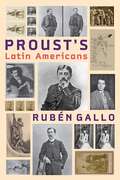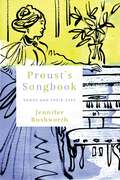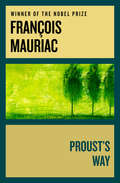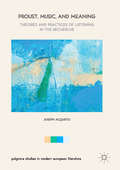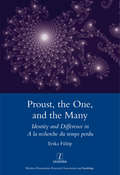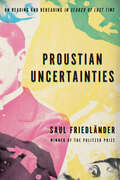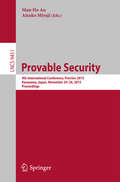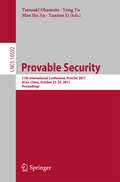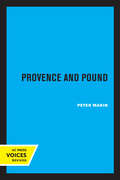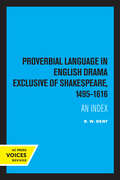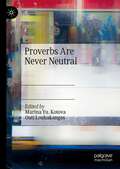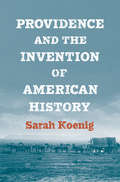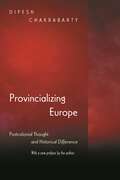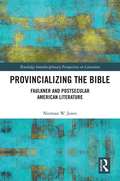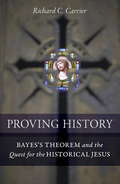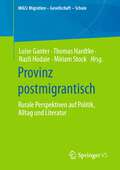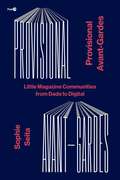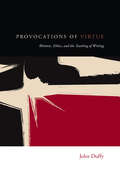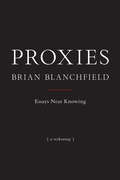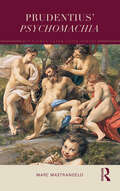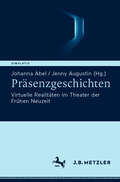- Table View
- List View
Proust's Latin Americans (Hopkins Studies in Modernism)
by Rubén GalloThe first discussion of Proust’s circle of Latin American friends, lovers, and literary models.Part biography, part cultural history, part literary study, Rubén Gallo's book explores the presence of Latin America in Proust's life and work. The novelist lived in an era shaped by French colonial expansion into the Americas: just before his birth, Napoleon III installed Maximilian as emperor of Mexico, and during the 1890s France was shaken by the Panama Affair, a financial scandal linked to the construction of the canal in which thousands of French citizens lost their life savings.It was in the context of these tense Franco–Latin American relations that the novelist met the circle of friends discussed in Proust's Latin Americans: the composer Reynaldo Hahn, Proust’s Venezuelan lover; Gabriel de Yturri, an Argentinean dandy; José-Maria de Heredia, a Cuban poet and early literary model; Antonio de La Gandara, a Mexican society painter; and Ramon Fernandez, a brilliant Mexican critic turned Nazi sympathizer.Gallo discusses the correspondence—some of it never before published—between the novelist and this heterogeneous group and also presents insightful readings of In Search of Lost Time that posit Latin America as the novel’s political unconscious. Proust’s speculation with Mexican stocks informed his various fictional passages devoted to financial transactions, and the Panama Affair shaped his understanding of the conquest of America in a little-known early text.Proust's Latin Americans will be of interest to scholars of modernism, French literature, Proust studies, gender studies, and Latin American studies.
Proust's Recherche: A Psychoanalytic Interpretation (Routledge Revivals)
by Randolph SplitterOriginally published in 1981 and now reissued with a new preface by Randolph Splitter, this volume examines Proust’s novel A la recherche du temps perdu from a psychoanalytic viewpoint, showing that Marcel, the central character, like the novel itself, is characterized by an unstable equilibrium of opposing forces, so that he wishes both to dissolve the boundaries between inner and outer worlds, and to maintain divisions and defenses. Instead of trying to force the text into a rigid theoretical structure this reading of Proust’s novel illuminates it by confronting and re-examining the problems that Freudian theory itself addresses. In considering these problems, the author also takes into account the findings of modern French psychoanalysis and literary criticism, referring particularly to the work of Jacques Lacan and Jacques Derrida.
Proust's Songbook: Songs and Their Uses (Sound in History)
by Jennifer RushworthIn Proust’s Songbook, Jennifer Rushworth analyzes and theorizes the presence and role of songs in Marcel Proust’s novel À la recherche du temps perdu (In Search of Lost Time). Instead of focusing on instrumental music and large-scale forms such as symphonies and opera, as is common in Proust musical studies, Rushworth argues for the centrality of songs and lyrics in Proust’s opus. Her work analyzes the ways in which the author inserted songs at key turning points in his novel and how he drew inspiration from contemporary composers and theorists of song. Rushworth presents detailed readings of five moments of song in À la recherche du temps perdu, highlighting the songs’ significance by paying close attention to their lyrics, music, composers, and histories.Rushworth interprets these episodes through theoretical reflections on song and voice, drawing particularly from the works of Reynaldo Hahn and Roland Barthes. She argues that songs in Proust’s novel are connected and resonate with one another across the different volumes yet also shows how song for Proust is a solo, amateur, and intimate affair. In addition, she points to Proust’s juxtapositions of songs with meditations on the notion of “mauvaise musique” (bad music) to demonstrate the existence of a blurred boundary between songs that are popular and songs that are art.According to Rushworth, a song for Proust has a special relation to repetition and memory due to its typical brevity and that song itself becomes a mode of resistance in À la Recherche—especially on the part of characters in the face of family and familial expectations. She also defines the songs in Proust’s novel as songs of farewell—noting that to sing farewell is a means to resist the very parting that is being expressed—and demonstrates how songs, in formal terms, resist the forward impetus of narrative.
Proust's Way
by François MauriacThe thinking and suffering of the author of Remembrance of Things Past are intimately exposed in these letters to Mauriac.
Proust's Way: A Field Guide to In Search of Lost Time
by Roger Shattuck"Shattuck leaves us not only with a deepened appreciation of Proust's great work but of all great literature as well."--Richard Bernstein, New York Times For any reader who has been humbled by the language, the density, or the sheer weight of Marcel Proust's In Search of Lost Time, Roger Shattuck is a godsend. Winner of the National Book Award for Marcel Proust, a sweeping examination of Proust's life and works, Shattuck now offers a useful and eminently readable guidebook to Proust's epic masterpiece, and a contemplation of memory and consciousness throughout great literature. Here, Shattuck laments Proust's defenselessness against zealous editors, praises some translations, and presents Proust as a novelist whose philosophical gifts were matched only by his irrepressible comic sense. Proust's Way, the culmination of a lifetime of scholarship, will serve as the next generation's guide to one of the world's finest writers of fiction.
Proust, Music, and Meaning
by Joseph AcquistoThis book is about reading Proust's novel via philosophical and musicological approaches to "modern" listening. It articulates how insights into the way we listen to and understand classical music inform the creation of literary meaning. It asks: are we to take at face value the ideas about art that the novel contains, or are those part of the fiction? Is there a difference between what the novel says and what it does, and how can music provide a key to answering that question? According to this study, Proust asks us to temporalize our interpretation by recognizing the distance between initial and final experiences of the novel, and by being open to the ways in which it challenges attempts at interpretive closure. Proust's novel responds to the kind of attentive and eternally changing perspectives that can be generated from music and our attempts to make sense of it.
Proust, the One, and the Many: Identity and Difference in A La Recherche Du Temps Perdu
by Erika Fulop"One of the many aspects that make Marcel Prousts A la recherche du temps perdu such a complex and subtle work is its engagement with metaphysical questions. The disparate nature of the narrators experiences, hypotheses, and statements has generated a number of conflicting interpretations, based on parallels with the thought of one or another philosopher from Plato to Leibniz, Spinoza, Schopenhauer, Nietzsche, Bergson, or Deleuze. Through the analysis of the narrators two seemingly incompatible perceptions of the world, which reveal reality to be either one or infinitely multiple, Erika Fuelop proposes a reading of the novel that reconciles the opposites. Rather than being undecided or self-contradictory, the narrative thematizes the insufficiency of the dualist perspective and invites the reader to take a step beyond it. Erika Fuelop is an independent researcher, whose doctoral thesis completed at the University of Aberdeen is at the basis of this monograph."
Proust: La Traduction du Sensible (University Of Wales Press - Studies In Visual Culture Ser.)
by Nathalie Aubert"In this innovative study, Nathalie Aubert demonstrates how the experience of translating Ruskin led Proust to see creative writing as itself an act of translation. She makes use of phenomenology to show how the Proustian metaphor operates as translation as it bridges the gap between reality and language."
Proustian Uncertainties: On Reading and Rereading In Search of Lost Time
by Saul FriedländerA Pulitzer Prize–winning historian revisits Marcel Proust&’s masterpiece in this essay on literature and memory, exploring the question of identity—that of the novel&’s narrator and Proust&’s own. This engaging reexamination of In Search of Lost Time considers how the narrator defines himself, how this compares to what we know of Proust himself, and what the significance is of these various points of commonality and divergence. We know, for example, that the author did not hide his homosexuality, but the narrator did. Why the difference? We know that the narrator tried to marginalize his part-Jewish background. Does this reflect the author&’s position, and how does the narrator handle what he tries, but does not manage, to dismiss? These are major questions raised by the text and reflected in the text, to which the author&’s life doesn&’t give obvious answers. The narrator&’s reflections on time, on death, on memory, and on love are as many paths leading to the image of self that he projects. In Proustian Uncertainties, Saul Friedländer draws on his personal experience from a life spent investigating the ties between history and memory to offer a fresh perspective on the seminal work.
Provable Security
by Man-Ho Au Atsuko MiyajiThis book constitutes the refereed proceedings of the 9th International Conference on Provable Security, ProvSec 2015, held in Kanazawa, Japan, in November 2015. The 19 full papers and 7 short papers presented together with 3 invited talks were carefully reviewed and selected from 60 submissions. The papers are grouped in topical sections on fundamental, protocol, authenticated encryption and key exchange, encryption and identification, privacy and cloud, leakage-resilient cryptography and lattice cryptography, signature and broadcast encryption.
Provable Security
by Yong Yu Tatsuaki Okamoto Man Ho Au Yannan LiThis book constitutes the refereed proceedings of the 11th International Conference on Provable Security, ProvSec 2017, held in Xi'an, China, in October 2017. The 24 full papers and 5 short papers presented were carefully reviewed and selected from 76 submissions. The papers are grouped in topical sections on secure cloud storage and computing; digital signature and authentication; authenticated encryption and key exchange; security models; lattice and post-quantum cryptography; public key encryption and signcryption; proxy re-encryption and functional encryption; protocols.
Provence and Pound
by Peter MakinThis title is part of UC Press's Voices Revived program, which commemorates University of California Press’s mission to seek out and cultivate the brightest minds and give them voice, reach, and impact. Drawing on a backlist dating to 1893, Voices Revived makes high-quality, peer-reviewed scholarship accessible once again using print-on-demand technology. This title was originally published in 1978.
Proverbial Language in English Drama Exclusive of Shakespeare, 1495-1616: An Index
by R. W. DentThis title is part of UC Press's Voices Revived program, which commemorates University of California Press’s mission to seek out and cultivate the brightest minds and give them voice, reach, and impact. Drawing on a backlist dating to 1893, Voices Revived makes high-quality, peer-reviewed scholarship accessible once again using print-on-demand technology. This title was originally published in 1984.
Proverbs Are Never Neutral
by Marina Yu. Kotova Outi LauhakangasThis book examines how proverbs can carry ethnonyms and contradictory oppositions in everyday speech, and interrogates the belief that such nuances are national in nature by comparing across languages and cultures. The authors bring together linguistic terms and typologies from Slavonic, Germanic, Romance, Finno-Ugric and Somali proverbs (with their English parallels) to enrich contrastive paremiology. The book pushes the thematic boundaries of the paremiological minima of languages by drawing on fields including sociolinguistics, and it will be of interest to students and scholars of cultural linguistics, comparative cultural studies, sociolinguistics, social identity, anthropology, cognitive semiotics, and the history of words and concepts.
Providence and the Invention of American History
by Sarah KoenigHow providential history—the conviction that God is an active agent in human history—has shaped the American historical imagination In 1847, Protestant missionary Marcus Whitman was killed after a disastrous eleven-year effort to evangelize the indigenous peoples of the Pacific Northwest. By 1897, Whitman was a national hero, celebrated in textbooks, monuments, and historical scholarship as the &“Savior of Oregon.&” But his fame was based on a tall tale—one that was about to be exposed. Sarah Koenig traces the rise and fall of Protestant missionary Marcus Whitman&’s legend, revealing two patterns in the development of American history. On the one hand is providential history, marked by the conviction that God is an active agent in human history and that historical work can reveal patterns of divine will. On the other hand is objective history, which arose from the efforts of Catholics and other racial and religious outsiders to resist providentialists&’ pejorative descriptions of non‑Protestants and nonwhites. Koenig examines how these competing visions continue to shape understandings of the American past and the nature of historical truth.
Provincializing Europe: Postcolonial Thought and Historical Difference - New Edition (Princeton Studies in Culture/Power/History)
by Dipesh ChakrabartyFirst published in 2000, Dipesh Chakrabarty's influential Provincializing Europe addresses the mythical figure of Europe that is often taken to be the original site of modernity in many histories of capitalist transition in non-Western countries. This imaginary Europe, Dipesh Chakrabarty argues, is built into the social sciences. The very idea of historicizing carries with it some peculiarly European assumptions about disenchanted space, secular time, and sovereignty. Measured against such mythical standards, capitalist transition in the third world has often seemed either incomplete or lacking. Provincializing Europe proposes that every case of transition to capitalism is a case of translation as well--a translation of existing worlds and their thought--categories into the categories and self-understandings of capitalist modernity. Now featuring a new preface in which Chakrabarty responds to his critics, this book globalizes European thought by exploring how it may be renewed both for and from the margins.
Provincializing the Bible: Faulkner and Postsecular American Literature
by Norman JonesWhy, in our supposedly secular age, does the Bible feature prominently in so many influential and innovative works of contemporary U.S. literature? More pointedly, why would a book indelibly allied with a long history of institutionalized oppressions play a supporting role—and not simply as an object of critique—in a wide variety of landmark literary representations of marginalized subjectivities? The answers to these questions go beyond mere playful re-appropriations or subversive resignifications of biblical themes, figures, and forms. This book shows how certain contemporary authors invoke the Bible in ways that undermine clear distinctions between "subversive" and "traditional"—indeed, that undermine clear distinctions between "secular" and "sacred." By tracing a key source of such complex literary invocations of the Bible back to William Faulkner’s major novels, Provincializing the Bible argues that these literary works, which might be termed postsecular, ironically provincialize the Bible as a means of reevaluating and revalorizing its significance in contemporary American culture.
Proving History
by Richard C. CarrierAnyone with an interest in historical methods, how historical knowledge can be justified, new applications of Bayes's Theorem, or the study of the historical Jesus will find this book to be essential reading.Almost all experts agree that the Jesus of the Bible is a composite of myth, legend, and some historical evidence. So what can we know about the real Jesus? For more than one hundred and fifty years, scholars have attempted to answer this question. Unfortunately, the quest for the historical Jesus has produced as many different images of the original Jesus as scholars who have studied the subject. The result is a confused mass of disparate opinions with no consensus view of what actually happened at the dawn of Christianity. And this uncertainty is not unique to the historical study of Jesus. The problems related to establishing the reliability of historical criteria apply equally to any historical analysis of the persons and events that have shaped our lives and the beliefs we hold dear. This in-depth discussion of New Testament scholarship and the challenges of history as a whole proposes Bayes's Theorem, which deals with probabilities under conditions of uncertainty, as a solution to the problem of establishing reliable historical criteria. The author demonstrates that valid historical methods--not only in the study of Christian origins but in any historical study--can be described by, and reduced to, the logic of Bayes's Theorem. Conversely, he argues that any method that cannot be reduced to this theorem is invalid and should be abandoned. Writing with thoroughness and clarity, the author explains Bayes's Theorem in terms that are easily understandable to professional historians and laypeople alike, employing nothing more than well-known primary school math. He then explores precisely how the theorem can be applied to history and addresses numerous challenges to and criticisms of its use in testing or justifying the conclusions that historians make about the important persons and events of the past. The traditional and established methods of historians are analyzed using the theorem, as well as all the major "historicity criteria" employed in the latest quest to establish the historicity of Jesus. The author demonstrates not only the deficiencies of these approaches but also ways to rehabilitate them using Bayes's Theorem.
Provinz postmigrantisch: Rurale Perspektiven auf Politik, Alltag und Literatur (MiGS: Migration - Gesellschaft - Schule)
by Miriam Stock Nazli Hodaie Luise Ganter Thomas HardtkeDer Band entwickelt eine postmigrantische Perspektive auf provinzielle oder provinzbezogene Kontexte und Positionierungen und vereinigt dabei literarische Perspektiven mit empirischen Zugängen zu Politik und Alltag. Es werden postmigrantische Aushandlungen in ruralen Kontexten in den Blick genommen und zudem gefragt, wie sich Vorstellungen zur „Provinz“ wie auch zur „Migration“ gegenseitig bedingen, neuformieren und wo dies konkret geschieht.
Provisional Avant-Gardes: Little Magazine Communities from Dada to Digital (Post*45)
by Sophie SeitaWhat would it mean to be avant-garde today? Arguing against the notion that the avant-garde is dead or confined to historically "failed" movements, this book offers a more dynamic and inclusive theory of avant-gardes that accounts for how they work in our present. Innovative in approach, Provisional Avant-Gardes focuses on the medium of the little magazine—from early Dada experiments to feminist, queer, and digital publishing networks—to understand avant-gardes as provisional and heterogeneous communities. Paying particular attention to neglected women writers, artists, and editors alongside more canonical figures, it shows how the study of little magazines can change our views of literary and art history while shedding new light on individual careers. By focusing on the avant-garde's publishing history and group dynamics, Sophie Seita also demonstrates a new methodology for writing about avant-garde practice across time, one that is applicable to other artistic and non-artistic communities and that speaks to contemporary practitioners as much as scholars. In the process, she addresses fundamental questions about the intersections of aesthetic form and politics and about what we consider to be literature and art.
Provocations of Virtue: Rhetoric, Ethics, and the Teaching of Writing
by John DuffyIn Provocations of Virtue, John Duffy explores the indispensable role of writing teachers and scholars in counteracting the polarized, venomous “post-truth” character of contemporary public argument. Teachers of writing are uniquely positioned to address the crisis of public discourse because their work in the writing classroom is tied to the teaching of ethical language practices that are known to moral philosophers as “the virtues”—truthfulness, accountability, open-mindedness, generosity, and intellectual courage. Drawing upon Aristotle’s Nicomachean Ethics and the branch of philosophical inquiry known as “virtue ethics,” Provocations of Virtue calls for the reclamation of “rhetorical virtues” as a core function in the writing classroom. Duffy considers what these virtues actually are, how they might be taught, and whether they can prepare students to begin repairing the broken state of public argument. In the discourse of the virtues, teachers and scholars of writing are offered a common language and a shared narrative—a story that speaks to the inherent purpose of the writing class and to what is at stake in teaching writing in the twenty-first century. This book is a timely and historically significant contribution to the field and will be of major interest to scholars and administrators in writing studies, rhetoric, composition, and linguistics as well as philosophers and those exploring ethics.
Proxies: Essays Near Knowing
by Brian BlanchfieldPast compunction, expressly unbeholden, these twenty-four single-subject essays train focus on a startling miscellany of topics —Foot Washing, Dossiers, Br’er Rabbit, Housesitting, Man Roulette, the Locus Amoenus—that begin to unpack the essayist himself and his life’s rotating concerns: sex and sexuality, poetry and poetics, subject positions in American labor (not excluding academia), and his upbringing in working-class, Primitive Baptist, central-piedmont North Carolina.
Prudentius’ Psychomachia (Routledge Later Latin Poetry)
by Marc MastrangeloThis new translation brings to life Prudentius' Psychomachia, one of the most widely read poems in western Europe from Late Antiquity through the Renaissance. With accompanying notes and introduction, this volume provides a fresh exploration of its themes and influence. The Psychomachia of Prudentius (348–c. 405), an allegorical epic poem of nearly 1,000 lines about the battle between the virtues and the vices for possession of the human soul, led early modern scholars to refer to the late antique poet as "the Christian Vergil." Combining depictions of violent, single combats with allusions to pagan epic poetry, biblical scenes, and Christian doctrine, the poem captures the dynamism of the later Roman Empire in which the pagan world was giving way to a new, Christian Europe. In this volume, the introduction sets the historical and literary context and illuminates the Psychomachia’s prominent role in western literary history. Mastrangelo’s translation aims to capture the rhetorical power of the author’s Roman Christian Latin for the 21st-century reader. The notes provide the reader with in-depth information on Prudentius’ Latinity, the Roman epic tradition, and Christian doctrine. This volume is directed at students and scholars across the disciplines of comparative literature, classics, religion, and ancient and medieval studies, as well as any reader interested in the history and development of literature in the West.
Przemysłowa Concentration Camp: The Camp, the Children, the Trials (The Holocaust and its Contexts)
by Johannes-Dieter Steinert Katarzyna PersonThis book explores one of the most notorious aspects of the German system of oppression in wartime Poland: the only purpose-built camp for children under the age of 16 years in German-occupied Europe. The camp at Przemysłowa street, or the Polen-Jugendverwahrlager der Sicherheitspolizei in Litzmannstadt as the Germans called it, was a concentration camp for children. The camp at Przemysłowa existed for just over two years, from December 1942 until January 1945. During that time, an unknown number of children, mainly Polish nationals, were imprisoned there and subjected to extreme physical and emotional abuse. For almost all, the consequences of atrocities which they endured in the camp remained with them for the rest of their lives. This book focuses on the establishment of the camp, the experience of the child prisoners, and the post-war investigations and trials. It is based on contemporary German documents, post-war Polish trials and German investigations, as well as dozens of testimonies from camp survivors, guards, civilian camp staff and the camp leadership
Präsenzgeschichten: Virtuelle Realitäten im Theater der Frühen Neuzeit (Simulatio. Theatertechniken in Literatur, Medien und Wissenschaft)
by Jenny Augustin Johanna AbelBei einem Blick auf virtuelle Realitäten im frühneuzeitlichen Theater gilt es, unsere vom digitalen Zeitalter geprägten Konzepte der Virtualität und Präsenz zu revidieren. Auf dem Gebiet der Kulturen der Romania haben multiple Präsenz- und Virtualitätsverständnisse eine lange und kontroverse Geschichte. In der Auseinandersetzung mit der Vorgeschichte erweiterter Realitätserfahrungen am Modell des Theaters geht es vor allem um die Einbettung von Vergegenwärtigungstechniken in verflochtene Geschichten und vielschichtige Narrationen vom wirkmächtig Virtuellen. Hier werden daher Präsenzgeschichten im Plural in diversen Medien und epistemischen Erzeugungskontexten durchgespielt.
